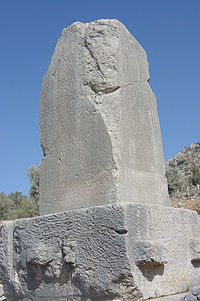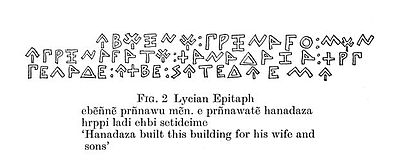- Lycian language
-
For other uses, see Lycian (disambiguation).
Lycian Trm̃mili 
Xanthos stele with Lycian inscriptionsSpoken in Lycia, Lycaonia Region Southwestern Anatolia Extinct 1st century BC Language family Writing system Lycian script Language codes ISO 639-3 xlc Lycian language (Lycian Trm̃mili[1]) refers to the inscriptional language of ancient Lycia, populated by Lycians, as well as its presumed spoken counterpart.
Contents
The speakers
Lycia covered the region lying between the modern cities of Antalya and Fethiye in southern Turkey, and especially the mountainous headland between Fethiye Bay and the Gulf of Antalya. The Lukka, as they were referred to in ancient Egyptian sources which mentions them among the Sea Peoples, probably also inhabited the region called Lycaonia, located along the next headland to the east, also mountainous, between the modern cities of Antalya and Mersin.
The language
Their language, Lycian, was an Indo-European language, one in the Luwian subgroup of Anatolian languages. The Luwian subgroup comprised also cuneiform and hieroglyphic Luwian, Carian, Sidetic and Pisidic.[2] All but Luwian were spoken only in the Iron Age, after roughly 1000 BC; thus neither the Lukka of the time of the Sea Peoples nor the Lycians cited among the allies of the Trojans during the Trojan War could have spoken any Lycian. Luwian language, on the other hand, extended back into the Late Bronze Age and preceded the fall of the Hittite Empire. This language vanished at about the time of the Neo-Hittite states in southern Anatolia (and Syria); thus, the Iron Age members of the subgroup are localized daughter languages of Luwian. Whether the Lukka people always resided in southern Anatolia or whether they always spoke Luwian are different topics. Lycian became extinct around the beginning of the first century BC, having been replaced by the Ancient Greek language.
The language is known from a few fairly extensive inscriptions. From them scholars have identified at least two dialects. One is considered standard Lycian, also termed Lycian A; the other, which is attested on side D of the Xanthos stele, is termed Lycian B or Milyan, separated by its grammatical particularities. Lycian had its own alphabet, which was closely related to the Greek alphabet but included at least one character borrowed from Carian, as well characters proper to the language. The words were often, but not always, separated by two points.
Endonym
A few etymological studies of the Lycian language endonym are present. These are:[1]
- Language of the mountain people (LaRoche). Luwian tarmi- "pointed object" becomes a hypothetical *tarmašši- "mountainous" used in Trm̃mis- "Lycia." Lycia and Pisidia each had a hill-town named Termessos.
- Attarima (Carruba). A previously unknown Late Bronze Age place name among the Lukka.
- Termilae (Bryce). A people displaced from Crete about 1600 BC.
- Termera (Strabo[3]) A Lelege people displaced by the Trojan War, first settling in Caria and assigning such names as Telmessos, Termera, Termerion, Termeros, Termilae, then displaced to Lycia by the Ionians.[4]
Sources
Lycian is known from these sources:[5][6]
- Personal and place names in Greek.
- 172 inscriptions on stone in the Lycian script dating from the late 5th century BC to the late 4th century BC.[7] They are categorized as:
- 150 burial instructions carved on rock tombs.
- 20 votive or dedicatory inscriptions.
- About 100 inscriptions on coins minted at Xanthus from the reign of Kuprili, 485-440 BC, to the reign of Pericle, 380-360 BC.[8]
- The Letoon trilingual, in Lycian A, Greek and Aramaic.
- The Xanthus stele bilingual. The inscribed upper part of a tomb at Xanthos, called the Xanthus Stele or the Xanthus Obelisk. A Lycian A inscription covers the south, east and part of the north faces. The north side also contains a 12-line poem in Greek and additional text, found mainly on the west side, in a dialect of Lycian called Milyan or Lycian B. The dialect appears only there and on a tomb in Antiphellos. The total number of lines on the stele is 255, including 243 in Lycian and 12 in Greek.
The inscriptional material covers a time span of about 170 years, between 500-330 BC.[9]
Description
A number of principal features help identify Lycian as being in the Luwian group:[10]
- Assibilation of Indo-European (IE in this article) palatals (Satem change): *ekwo- (the original k was palatal[11]) to Luwian á-zú-wa/i-, Lycian esbe, "horse."
- Replacement of genitive case with adjectives ending in -ahi or -ehi, Luwian -assi-.
- A preterite active formed with Indo-European secondary middle endings:
- IE *-to to Luwian -ta, Lycian te- or de- in the third person singular
- IE *-nto to Luwian -nta, Lycian (n)te in the third person plural
- Similarity of words: Luwian māssan(i)-, Lycian māhān(i), "god."
Notes
- ^ a b Bryce (1986) page 30.
- ^ Adiego (2007) page 763.
- ^ Strabo 7.7.1, 13.1.59.
- ^ Strabo 14.1.3, 14.2.18.
- ^ Adiego (2007) page 764.
- ^ Bryce (1986) page 42.
- ^ Bryce (1986) page 50.
- ^ Bryce (1986) pages 51–52.
- ^ Bryce (1986) page 54.
- ^ Adiego (2007) page 765.
- ^ "*ekwo-". The American Heritage Dictionary of the English Language: Fourth Edition. 2000. http://www.bartleby.com/61/roots/IE124.html. Retrieved 2008-03-18.
See also
External links
References
- Adiego, I.J.; Chris Markham, Translator (2007). "Greek and Lycian". In Christidis, A.F.; Arapopoulou, Maria; Chriti, Maria. A History of Ancient Greek From the Beginning to Late Antiquity. Cambridge University press. ISBN 0521833078. Translator Chris Markham.
- Bryce, Trevor R. (1986). The Lycians - Volume I: The Lycians in Literary and Epigraphic Sources. Copenhagen: Museum Tusculanum Press. ISBN 87-7289-023-1.
Categories:- Lycian language
- Ancient languages
- Lycia
- Extinct languages of Asia
Wikimedia Foundation. 2010.

